冀教版八年级下册Unit 6 Be a Champion! Lesson 33 2800 Years of Sports课件(共34张PPT)
文档属性
| 名称 | 冀教版八年级下册Unit 6 Be a Champion! Lesson 33 2800 Years of Sports课件(共34张PPT) |

|
|
| 格式 | pptx | ||
| 文件大小 | 543.5KB | ||
| 资源类型 | 教案 | ||
| 版本资源 | 冀教版 | ||
| 科目 | 英语 | ||
| 更新时间 | 2024-05-02 18:13:38 | ||
图片预览

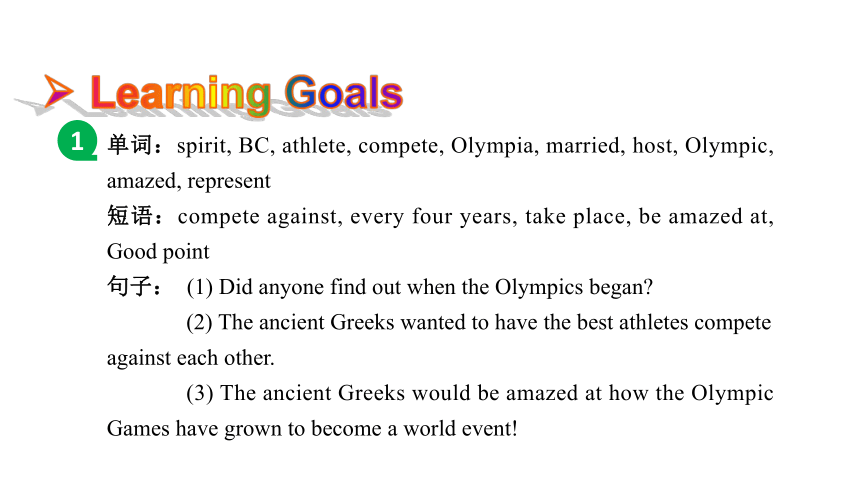
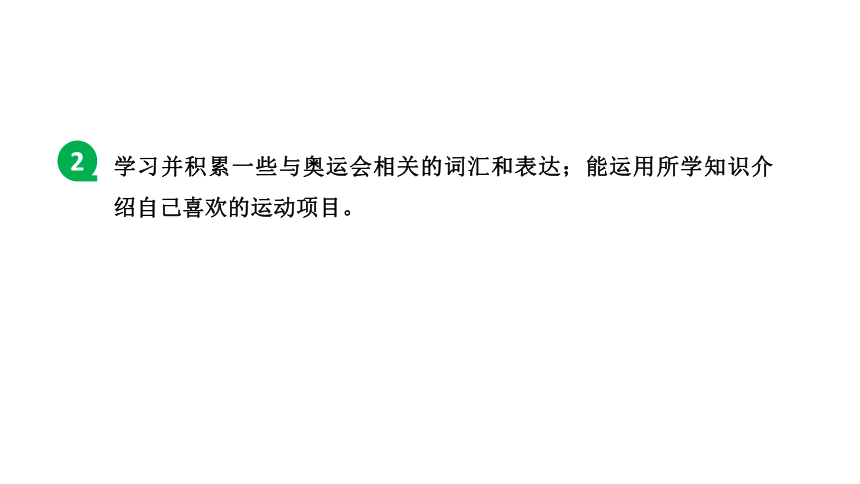

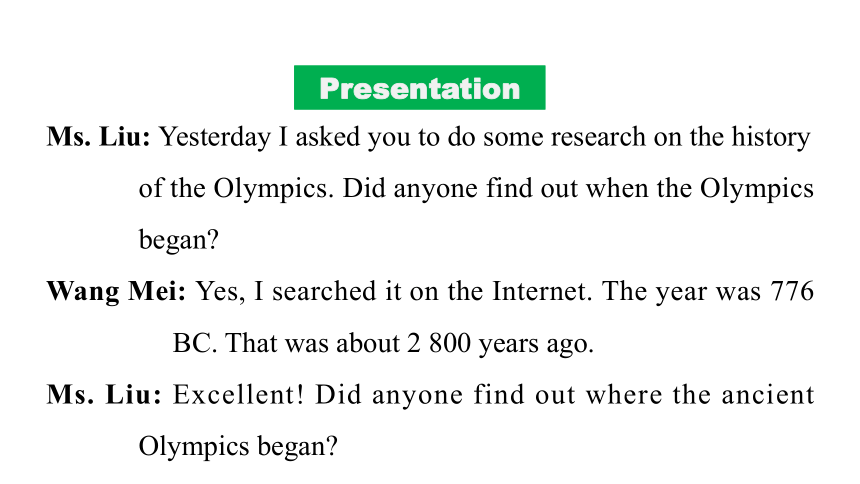
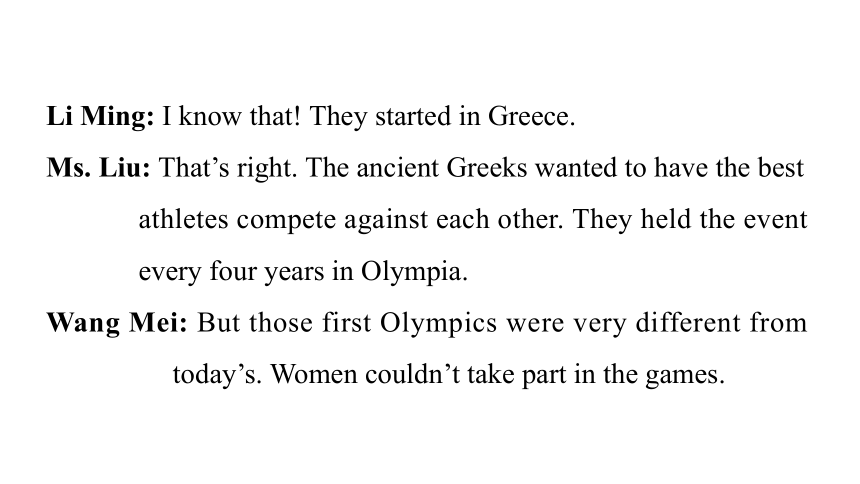
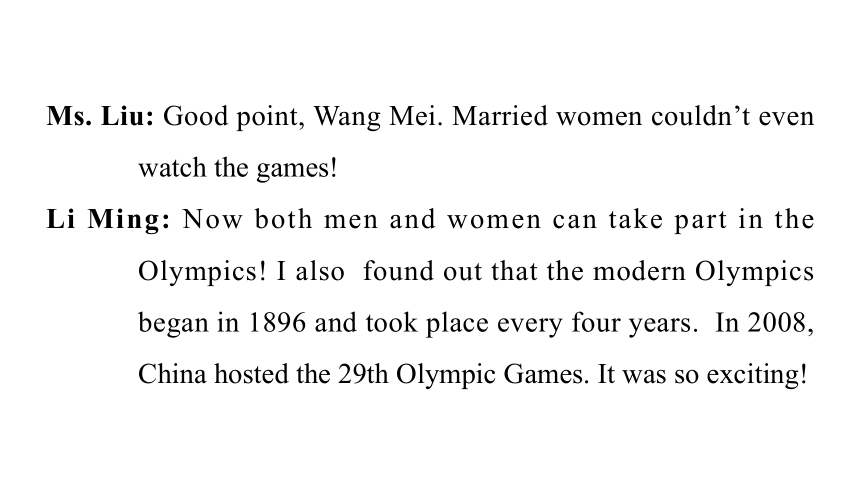
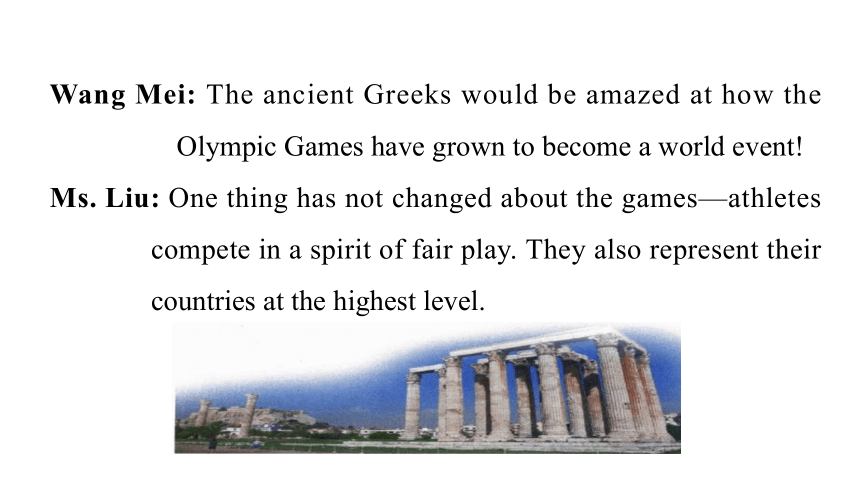
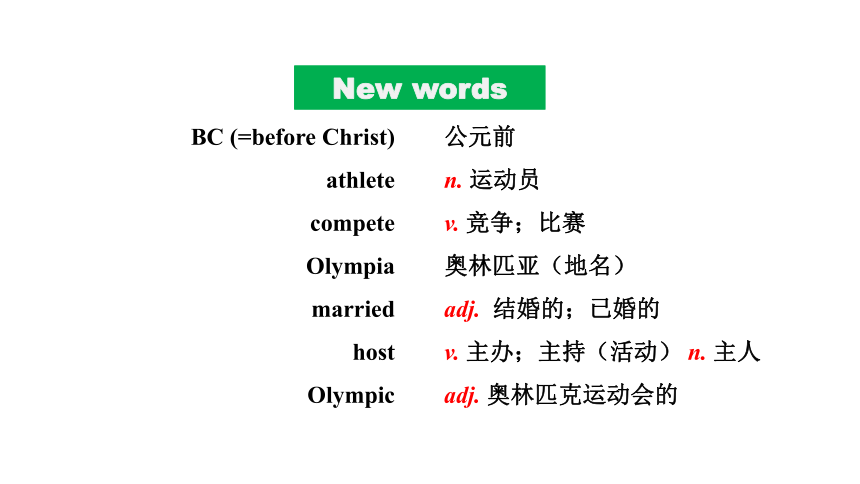
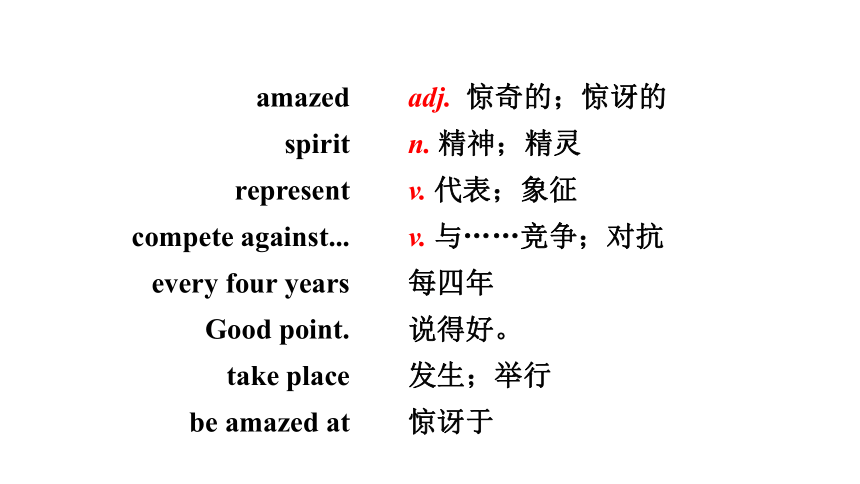
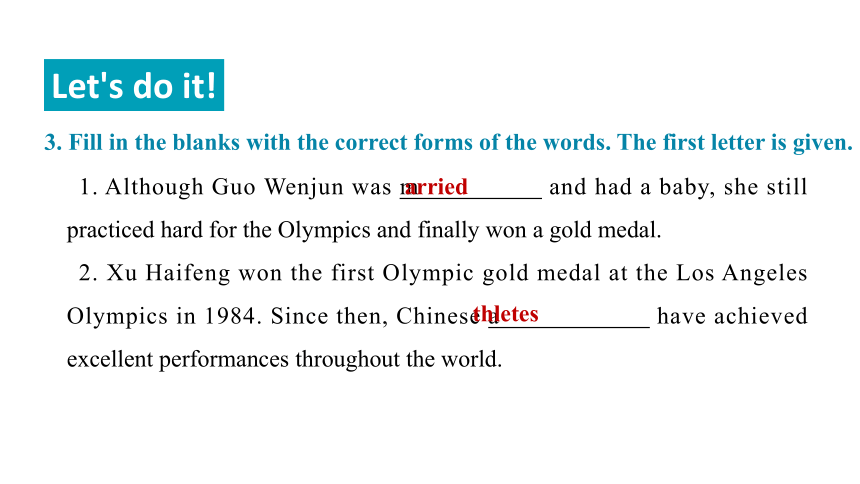
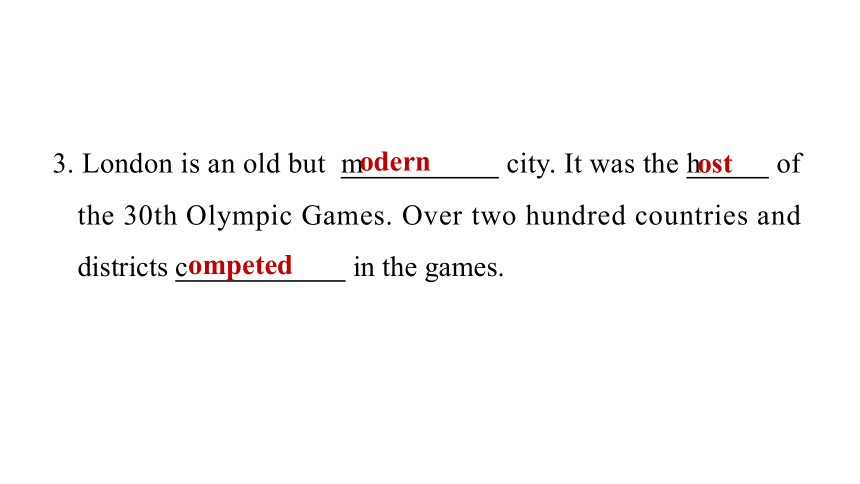
文档简介
(共34张PPT)
Lesson 33: 2 800 Years of Sports
Unit 6 Be a Champion!
单词:spirit, BC, athlete, compete, Olympia, married, host, Olympic, amazed, represent
短语:compete against, every four years, take place, be amazed at, Good point
句子: (1) Did anyone find out when the Olympics began
(2) The ancient Greeks wanted to have the best athletes compete against each other.
(3) The ancient Greeks would be amazed at how the Olympic Games have grown to become a world event!
Learning Goals
1
学习并积累一些与奥运会相关的词汇和表达;能运用所学知识介绍自己喜欢的运动项目。
2
Free Talk
Have you ever watched the Olympics on TV
Do you know anything about the Olympics
Presentation
Ms. Liu: Yesterday I asked you to do some research on the history of the Olympics. Did anyone find out when the Olympics began
Wang Mei: Yes, I searched it on the Internet. The year was 776 BC. That was about 2 800 years ago.
Ms. Liu: Excellent! Did anyone find out where the ancient Olympics began
Li Ming: I know that! They started in Greece.
Ms. Liu: That’s right. The ancient Greeks wanted to have the best athletes compete against each other. They held the event every four years in Olympia.
Wang Mei: But those first Olympics were very different from today’s. Women couldn’t take part in the games.
Ms. Liu: Good point, Wang Mei. Married women couldn’t even watch the games!
Li Ming: Now both men and women can take part in the Olympics! I also found out that the modern Olympics began in 1896 and took place every four years. In 2008, China hosted the 29th Olympic Games. It was so exciting!
Wang Mei: The ancient Greeks would be amazed at how the Olympic Games have grown to become a world event!
Ms. Liu: One thing has not changed about the games—athletes compete in a spirit of fair play. They also represent their countries at the highest level.
New words
BC (=before Christ)
athlete
compete
Olympia
married
host
Olympic
公元前
n. 运动员
v. 竞争;比赛
奥林匹亚(地名)
adj. 结婚的;已婚的
v. 主办;主持(活动) n. 主人
adj. 奥林匹克运动会的
amazed
spirit
represent
compete against...
every four years
Good point.
take place
be amazed at
adj. 惊奇的;惊讶的
n. 精神;精灵
v. 代表;象征
v. 与……竞争;对抗
每四年
说得好。
发生;举行
惊讶于
Let's do it!
3. Fill in the blanks with the correct forms of the words. The first letter is given.
1. Although Guo Wenjun was m and had a baby, she still practiced hard for the Olympics and finally won a gold medal.
2. Xu Haifeng won the first Olympic gold medal at the Los Angeles Olympics in 1984. Since then, Chinese a have achieved excellent performances throughout the world.
arried
thletes
3. London is an old but m city. It was the h of the 30th Olympic Games. Over two hundred countries and districts c in the games.
odern
ost
ompeted
Let's do it!
2. Listen to the passage and fill in the blanks.
The Olympic Games are _______ and ________. The ancient Olympics started in _______ BC and lasted for more than a thousand years. They took place every four years. ________ could not compete in the ancient Olympics. In 1896, a ___________ started the modern Olympic Games. He believed the games would help bring __________ and fair play to people all over the world. Now there are ________ and ________ Olympics every four years.
Women
Frenchman
friendship
new
old
776
Summer
Winter
1. When did the Olympics begin
In 1896.
2. Where did the ancient Olympics start
In 2008.
3. When did the first modern Olympics begin
Yes, it was.
4. When were the Beijing Olympics
In 779 BC.
5. Was this the first time for China to hold the Olympic Games
In Greece.
Reading and Answering
Language points
1. Did anyone find out when the Olympics began?有人查到奥运会是从什么时候开始的吗?
find out 找出,查清楚。它多指通过调查、询问、研究之后搞清楚、弄明白,通常含有经过困难、曲折的经历最终弄清楚较难找到的、抽象的东西。
※ Can you find out when the flight will take off?
你能查出这次航班何时起飞吗?
find找到,发现。强调“找”的结果,其宾语往往是某件丢失的东西或某个人。
※ I can’t find my pen. Can I borrow yours
我找不到我的钢笔了。我能借一下你的吗
look for寻找。指有目的地寻找,强调“找”这个动作,结果如何不清楚。
※ The young couple are looking for their lost baby everywhere.
这对年轻的夫妇正在到处寻找他们丢失的孩子。
2. The ancient Greeks wanted to have the best athletes compete against each other. 古希腊人想让最优秀的运动员互相竞争。
(1) athlete n.运动员,为可数名词,其复数形式为athletes。
※ Which athlete is the champion?
哪位运动员是冠军?
(2) compete against 与……竞争;对抗。其后接对手,相当于compete with。
※ Our school football team competed against the team from Yuhua Middle School.
我们校足球队和来自育华中学的足球队进行了比赛。
3. They held the event every four years in Olympia.
※ every four years 每四年
every和基数词、序数词、other或few连用,表示时间或空间的间隔,意为“每……;每隔……”。
every +基数词+复数名词= every +序数词+单数名词
※ every few months 每几个月
※ He comes here every three days. =He comes here every third day.
他每三天来这儿一次。
4. Women couldn’t take part in the games.女子不能参加比赛。
辨析:take part in, join in与join
三者都有“参加,加入”之意,但有区别。
① take part in指参加某项活动、集会等并在其中发挥作用。
※ Last week I took part in the school sports meet.上周我参加了学校运动会。
② join in表示参加某项运动、比赛等,多指正在进行的活动。
※ May I join in the game?我可以参加这个游戏吗?
③ join指加入到某一组织、团体中并成为其中的一员。
※ When did you join the Party?你什么时候入的党?
5. Married women couldn’t even watch the games!已婚女子甚至不能观看比赛!
married adj. 已婚的。be married已婚(表状态),可与表示一段时间的状语连用。be / get married to... 与……结婚。
※ He has been married for two years.
他已结婚两年了。
拓展:marry是married的动词形式,表示“嫁;娶”,后面直接跟宾语。
※ She wants to marry a rich man.
她想嫁个有钱人。
marry是短暂性动词,不能与一段时间连用,若与时间段连用,需用be married替代。
※ My parents have been married for forty years.
我的父母已经结婚40年了。
6. Now both men and women can take part in the Olympics!
take part in参加,part前通常不用冠词,但是如果part前有形容词修饰,要加不定冠词。
※ He doesn’t take an active part in many school activities.
他不积极参加许多的学校活动。
辨析:take part in,join与join in
① take part in指主动参加会议或群众性活动等,并在活动中发挥作用。
② join指加入某个团体、组织或某个人群中,并成为其成员之一。
③ join in多指参加小规模的活动,如球赛、游戏等,常用于日常口语,可以和take part in互换。
7. I also found out that the modern Olympics began in 1896 and took place every four years. 我还查到现代奥运会始于1896年,每四年举办一次。
(1)辨析:take place与happen
take place举办,发生。常指(某事)按计划进行或发生。
happen:①发生。指某事偶然发生或未能预见的事情发生。②碰巧,恰好。固定搭配:happen to do sth. 碰巧做某事。
※ Our school sports meet takes place every year.
我们学校的运动会每年举办一次。
※ An accident happened just now.
刚才发生了一起事故。
(2) every four years每四年(一次)。every意为“每一”,“every+基数词+单位名词”表示“每……一次”,表示频率,因此用how often对其进行提问。在此结构中,数词通常是大于一的数,单位名词用复数。
※ Mr. Zhao goes to Shenzhen every three years.
赵先生每三年去深圳一次。
8. In 2008,China hosted the 29th Olympic Games. 在2008年,中国主办了第29届奥运会。
host v. 主办;主持(活动)
※ Which country is going to host the next World Cup?
哪个国家将举办下一届世界杯?
9. The ancient Greeks would be amazed at how the Olympic Games have grown to become a world event!
be amazed at… 惊讶于……,相当于be surprised at...
※ He is amazed at the news.
他对这条新闻感到很惊讶。
※ We were amazed to hear the news.
听到这条新闻,我们感到很惊讶。
10. One thing has not changed about the games—athletes compete in a spirit of fair play.
spirit n. 精神;心灵
spirit作“精神;心灵”讲时,既可作可数名词也可作不可数名词。
※ Fang Junming, from Hubei, showed the spirit of sacrifice.
来自湖北的方俊明表现出了牺牲精神。
spirit还可作“灵魂;幽灵”讲,此时是可数名词。
※ Are there such things as spirits
有灵魂这样的东西吗
spirit作“情绪”讲时,多用复数形式。
※ He is in low spirits.
他情绪低落。
11. They also represent their countries at the highest level.
represent v. 代表;象征
※ They represented only a small section of public opinions.
他们仅代表了一小部分民众的意见。
Practice
用括号中所给词语的适当形式填空。
1. Can _________ (marry) women take part in the Olympics
2. She felt ________ (excite) at the good news.
3. Zhuang Yong is one of the best _________(swim) in the world.
4. He was a little _______ (slow) than Jenny in the race.
5. Do you know who was the _______ (win) of last game
married
swimers
winner
excited
slower
Sum up
1. The new words:
spirit, BC, athlete, compete, Olympia, married, host, Olympic, amazed, represent
2. Important phrases:
compete against, every four years, take place, be amazed at, Good point
3. Important sentences:
(1) Did anyone find out when the Olympics began
(2) The ancient Greeks wanted to have the best athletes compete against each other.
(3) The ancient Greeks would be amazed at how the Olympic Games have grown to become a world event!
Homework
1. Remember the new words and expressions learnt in this lesson.
2. Preview Lesson 34.
Lesson 33: 2 800 Years of Sports
Unit 6 Be a Champion!
单词:spirit, BC, athlete, compete, Olympia, married, host, Olympic, amazed, represent
短语:compete against, every four years, take place, be amazed at, Good point
句子: (1) Did anyone find out when the Olympics began
(2) The ancient Greeks wanted to have the best athletes compete against each other.
(3) The ancient Greeks would be amazed at how the Olympic Games have grown to become a world event!
Learning Goals
1
学习并积累一些与奥运会相关的词汇和表达;能运用所学知识介绍自己喜欢的运动项目。
2
Free Talk
Have you ever watched the Olympics on TV
Do you know anything about the Olympics
Presentation
Ms. Liu: Yesterday I asked you to do some research on the history of the Olympics. Did anyone find out when the Olympics began
Wang Mei: Yes, I searched it on the Internet. The year was 776 BC. That was about 2 800 years ago.
Ms. Liu: Excellent! Did anyone find out where the ancient Olympics began
Li Ming: I know that! They started in Greece.
Ms. Liu: That’s right. The ancient Greeks wanted to have the best athletes compete against each other. They held the event every four years in Olympia.
Wang Mei: But those first Olympics were very different from today’s. Women couldn’t take part in the games.
Ms. Liu: Good point, Wang Mei. Married women couldn’t even watch the games!
Li Ming: Now both men and women can take part in the Olympics! I also found out that the modern Olympics began in 1896 and took place every four years. In 2008, China hosted the 29th Olympic Games. It was so exciting!
Wang Mei: The ancient Greeks would be amazed at how the Olympic Games have grown to become a world event!
Ms. Liu: One thing has not changed about the games—athletes compete in a spirit of fair play. They also represent their countries at the highest level.
New words
BC (=before Christ)
athlete
compete
Olympia
married
host
Olympic
公元前
n. 运动员
v. 竞争;比赛
奥林匹亚(地名)
adj. 结婚的;已婚的
v. 主办;主持(活动) n. 主人
adj. 奥林匹克运动会的
amazed
spirit
represent
compete against...
every four years
Good point.
take place
be amazed at
adj. 惊奇的;惊讶的
n. 精神;精灵
v. 代表;象征
v. 与……竞争;对抗
每四年
说得好。
发生;举行
惊讶于
Let's do it!
3. Fill in the blanks with the correct forms of the words. The first letter is given.
1. Although Guo Wenjun was m and had a baby, she still practiced hard for the Olympics and finally won a gold medal.
2. Xu Haifeng won the first Olympic gold medal at the Los Angeles Olympics in 1984. Since then, Chinese a have achieved excellent performances throughout the world.
arried
thletes
3. London is an old but m city. It was the h of the 30th Olympic Games. Over two hundred countries and districts c in the games.
odern
ost
ompeted
Let's do it!
2. Listen to the passage and fill in the blanks.
The Olympic Games are _______ and ________. The ancient Olympics started in _______ BC and lasted for more than a thousand years. They took place every four years. ________ could not compete in the ancient Olympics. In 1896, a ___________ started the modern Olympic Games. He believed the games would help bring __________ and fair play to people all over the world. Now there are ________ and ________ Olympics every four years.
Women
Frenchman
friendship
new
old
776
Summer
Winter
1. When did the Olympics begin
In 1896.
2. Where did the ancient Olympics start
In 2008.
3. When did the first modern Olympics begin
Yes, it was.
4. When were the Beijing Olympics
In 779 BC.
5. Was this the first time for China to hold the Olympic Games
In Greece.
Reading and Answering
Language points
1. Did anyone find out when the Olympics began?有人查到奥运会是从什么时候开始的吗?
find out 找出,查清楚。它多指通过调查、询问、研究之后搞清楚、弄明白,通常含有经过困难、曲折的经历最终弄清楚较难找到的、抽象的东西。
※ Can you find out when the flight will take off?
你能查出这次航班何时起飞吗?
find找到,发现。强调“找”的结果,其宾语往往是某件丢失的东西或某个人。
※ I can’t find my pen. Can I borrow yours
我找不到我的钢笔了。我能借一下你的吗
look for寻找。指有目的地寻找,强调“找”这个动作,结果如何不清楚。
※ The young couple are looking for their lost baby everywhere.
这对年轻的夫妇正在到处寻找他们丢失的孩子。
2. The ancient Greeks wanted to have the best athletes compete against each other. 古希腊人想让最优秀的运动员互相竞争。
(1) athlete n.运动员,为可数名词,其复数形式为athletes。
※ Which athlete is the champion?
哪位运动员是冠军?
(2) compete against 与……竞争;对抗。其后接对手,相当于compete with。
※ Our school football team competed against the team from Yuhua Middle School.
我们校足球队和来自育华中学的足球队进行了比赛。
3. They held the event every four years in Olympia.
※ every four years 每四年
every和基数词、序数词、other或few连用,表示时间或空间的间隔,意为“每……;每隔……”。
every +基数词+复数名词= every +序数词+单数名词
※ every few months 每几个月
※ He comes here every three days. =He comes here every third day.
他每三天来这儿一次。
4. Women couldn’t take part in the games.女子不能参加比赛。
辨析:take part in, join in与join
三者都有“参加,加入”之意,但有区别。
① take part in指参加某项活动、集会等并在其中发挥作用。
※ Last week I took part in the school sports meet.上周我参加了学校运动会。
② join in表示参加某项运动、比赛等,多指正在进行的活动。
※ May I join in the game?我可以参加这个游戏吗?
③ join指加入到某一组织、团体中并成为其中的一员。
※ When did you join the Party?你什么时候入的党?
5. Married women couldn’t even watch the games!已婚女子甚至不能观看比赛!
married adj. 已婚的。be married已婚(表状态),可与表示一段时间的状语连用。be / get married to... 与……结婚。
※ He has been married for two years.
他已结婚两年了。
拓展:marry是married的动词形式,表示“嫁;娶”,后面直接跟宾语。
※ She wants to marry a rich man.
她想嫁个有钱人。
marry是短暂性动词,不能与一段时间连用,若与时间段连用,需用be married替代。
※ My parents have been married for forty years.
我的父母已经结婚40年了。
6. Now both men and women can take part in the Olympics!
take part in参加,part前通常不用冠词,但是如果part前有形容词修饰,要加不定冠词。
※ He doesn’t take an active part in many school activities.
他不积极参加许多的学校活动。
辨析:take part in,join与join in
① take part in指主动参加会议或群众性活动等,并在活动中发挥作用。
② join指加入某个团体、组织或某个人群中,并成为其成员之一。
③ join in多指参加小规模的活动,如球赛、游戏等,常用于日常口语,可以和take part in互换。
7. I also found out that the modern Olympics began in 1896 and took place every four years. 我还查到现代奥运会始于1896年,每四年举办一次。
(1)辨析:take place与happen
take place举办,发生。常指(某事)按计划进行或发生。
happen:①发生。指某事偶然发生或未能预见的事情发生。②碰巧,恰好。固定搭配:happen to do sth. 碰巧做某事。
※ Our school sports meet takes place every year.
我们学校的运动会每年举办一次。
※ An accident happened just now.
刚才发生了一起事故。
(2) every four years每四年(一次)。every意为“每一”,“every+基数词+单位名词”表示“每……一次”,表示频率,因此用how often对其进行提问。在此结构中,数词通常是大于一的数,单位名词用复数。
※ Mr. Zhao goes to Shenzhen every three years.
赵先生每三年去深圳一次。
8. In 2008,China hosted the 29th Olympic Games. 在2008年,中国主办了第29届奥运会。
host v. 主办;主持(活动)
※ Which country is going to host the next World Cup?
哪个国家将举办下一届世界杯?
9. The ancient Greeks would be amazed at how the Olympic Games have grown to become a world event!
be amazed at… 惊讶于……,相当于be surprised at...
※ He is amazed at the news.
他对这条新闻感到很惊讶。
※ We were amazed to hear the news.
听到这条新闻,我们感到很惊讶。
10. One thing has not changed about the games—athletes compete in a spirit of fair play.
spirit n. 精神;心灵
spirit作“精神;心灵”讲时,既可作可数名词也可作不可数名词。
※ Fang Junming, from Hubei, showed the spirit of sacrifice.
来自湖北的方俊明表现出了牺牲精神。
spirit还可作“灵魂;幽灵”讲,此时是可数名词。
※ Are there such things as spirits
有灵魂这样的东西吗
spirit作“情绪”讲时,多用复数形式。
※ He is in low spirits.
他情绪低落。
11. They also represent their countries at the highest level.
represent v. 代表;象征
※ They represented only a small section of public opinions.
他们仅代表了一小部分民众的意见。
Practice
用括号中所给词语的适当形式填空。
1. Can _________ (marry) women take part in the Olympics
2. She felt ________ (excite) at the good news.
3. Zhuang Yong is one of the best _________(swim) in the world.
4. He was a little _______ (slow) than Jenny in the race.
5. Do you know who was the _______ (win) of last game
married
swimers
winner
excited
slower
Sum up
1. The new words:
spirit, BC, athlete, compete, Olympia, married, host, Olympic, amazed, represent
2. Important phrases:
compete against, every four years, take place, be amazed at, Good point
3. Important sentences:
(1) Did anyone find out when the Olympics began
(2) The ancient Greeks wanted to have the best athletes compete against each other.
(3) The ancient Greeks would be amazed at how the Olympic Games have grown to become a world event!
Homework
1. Remember the new words and expressions learnt in this lesson.
2. Preview Lesson 34.
同课章节目录
- Unit 1 Spring Is Coming
- Lesson 1 How's the weather?
- Lesson 2 It's Getting Warmer!
- Lesson 3 Sun Is Rising
- Lesson 4 The Spring City
- Lesson 5 Babysitting on a Spring Day
- Lesson 6 Stories about Spring
- Unit 2 Plant a Plant
- Lesson 7 Planting Trees
- Lesson 8 Why Are Plants Important?
- Lesson 9 Gardening with Mary
- Lesson 10 Make Your Garden Grow!
- Lesson 11 Amazing Plants
- Lesson 12 Danny's Plant
- Unit 3 Animals Are Our Friends
- Lesson 13 Danny's Big Scare
- Lesson 14 Amazing Animals
- Lesson 15 The Zoo Is Open
- Lesson 16 The Pear Escaped
- Lesson 17 Save the Tigers
- Lesson 18 Friendship Between Animals
- Unit 4 The Internet Connects Us
- Lesson 19 How Do You Use the Internet?
- Lesson 20 A Computer Helps!
- Lesson 21 Books or Computers?
- Lesson 22 Travel on the Internet
- Lesson 23 The Internet--Good or Bad?
- Lesson 24 An E-mail to Grandpa
- Unit 5 Buying and Selling
- Lesson 25 Raising Money
- Lesson 26 Cookies, Please!
- Lesson 27 Business English
- Lesson 28 Ms. Liu's Great Idea
- Lesson 29 How to Push a Product
- Lesson 30 A Cookie Sale
- Unit 6 Be a Champion!
- Lesson 31 Don't Fall, Danny
- Lesson 32 My Favourite Record
- Lesson 33 2800 Years of Sports
- Lesson 34 Modern Olympics
- Lesson 35 The Dream Team
- Lesson 36 Classroom Olympics
- Unit 7 Know Our World
- Lesson 37 Let's Learn Geography!
- Lesson 38 The World Is a Big Place
- Lesson 39 Ring Up or Call?
- Lesson 40 Body Language
- Lesson 41 A Class of the World
- Lesson 42 North America
- Unit 8 Save Our World
- Lesson 43 Let's Clean Up!
- Lesson 44 Environment Clubs
- Lesson 45 Let's Sort Garbage!
- Lesson 46 Protect Our Environment
- Lesson 47 Connected to Nature
- Lesson 48 Garbage Is Interesting!
